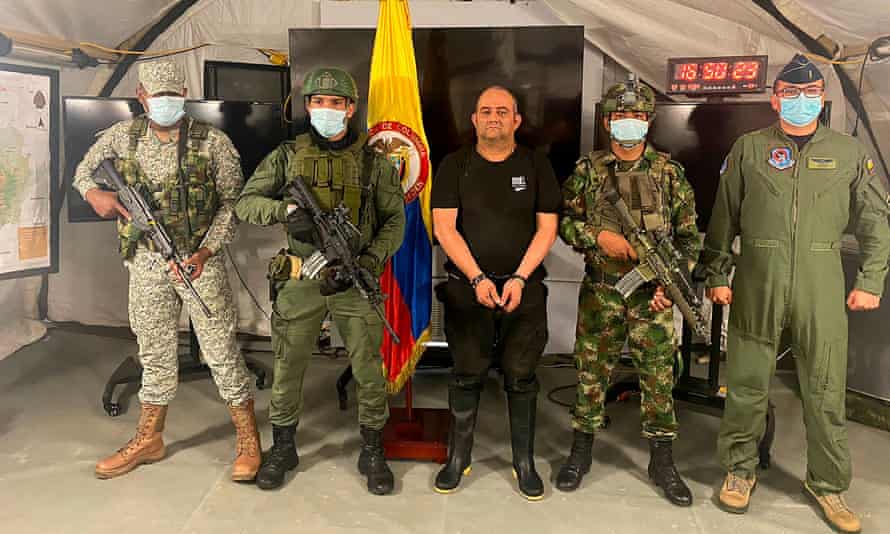Colombia’s president, Iván Duque, has celebrated the downfall of “the most feared drug trafficker on Earth” after one of South America’s most wanted men was captured at his rainforest hideout following a massive manhunt involving hundreds of troops as well as US and British intelligence agencies.
Dairo Antonio Úsuga, the 50-year-old head of the Clan del Golfo drug cartel, was arrested on Saturday afternoon after heavily armed operatives laid siege to the criminal’s jungle stomping ground in north-west Colombia.
“Identify yourself!” a special forces army sergeant reportedly bellowed at the shirtless fugitive, who is known as Otoniel, after spotting him trying to hide beneath a heap of branches and scrubs.
“Cool it, soldier,” replied Úsuga, before confirming his name, raising his hands and asking not to be killed.
By nightfall, the former leftwing guerrilla and paramilitary had been flown to Colombia’s capital, Bogotá, handcuffed and stony-faced, where he was paraded before the media wearing black wellington boots.
In a triumphant televised broadcast, Duque compared the arrest to the 1993 slaying of Pablo Escobar in Medellín, saying: “This is the most severe blow that has been dealt to drug trafficking in this country this century.”
Colombian authorities had been pursuing Úsuga for about a decade, with the US state department offering a $5m reward for information leading to the capture of a criminal it accused of controlling a vast network of cocaine laboratories and illegal runways and speedboat jetties used to smuggle drugs north. A total of 132 warrants had been issued for Úsuga’s arrest.

The cartel boss’s fate was reportedly sealed early this year when authorities decided to intensify their hunt, amid soaring levels of cocaine production.
Two weeks ago, intelligence officers managed to identify the approximate location of Úsuga’s hideout in the highly strategic Urabá region near the border with Panama, according to an account published by the Colombian newspaper El Tiempo on Sunday. They did so partly thanks to cartel employees who were ferrying medicine to the drug lord to treat kidney problems.
At about 5am on Friday, the decision was taken to launch Operación Osiris, a multi-pronged military assault on Úsuga’s rural domain, which security chiefs named after the ancient Egyptian god of the underworld.
Colombian media reports said the operation involved more than 20 helicopters, 10 unmanned surveillance drones and hundreds of troops who blocked rivers and roads to stop the target – codenamed “El Blanco” – fleeing a 3.5 sq km search area in Antioquia province. As commandos swarmed toward their objective past eight rings of security, navy vessels lurked offshore in the Caribbean Sea to ensure Úsuga could not escape by boat.
By Saturday afternoon, the news magazine Semana said four members of an elite army unit had tracked the “bloodthirsty capo” to near a simple wooden farmhouse in the Paramillo Massif mountain range. It was there that, shortly before 3pm local time, the criminal’s exact hiding place was betrayed by the sound of rustling undergrowth.
“Don’t kill me, don’t kill me,” he pleaded, before asking for a sip of water and falling silent. “Otoniel and his empire had collapsed,” declared Semana, which claimed the gangster asked police not to strip him of a medallion featuring a photograph of his parents embracing.
Colombia’s unpopular conservative president, who took office in 2018 and will step down next year, trumpeted the gangster’s capture – during which one police officer was killed – as a landmark victory against organised crime in a country that produces an estimated 70% of the world’s cocaine.
“Otoniel was the most feared drug trafficker in the entire world,” Duque said, claiming his demise meant the Clan del Golfo was finished.
Duque thanked the US and British governments for collaborating on intelligence, although their exact contribution to the operation was not clear. The British embassy in Bogotá congratulated Colombia’s government and security forces, calling the arrest “a major blow to crime and armed groups”.
Experts are sceptical that Úsuga’s detention will prove a gamechanger in Colombia’s decades-long drug conflict, which has claimed tens of thousands of lives.
“His capture is no minor feat and not something I want to underplay [but] the equation of the war on drugs remains unchanged,” said Sergio Guzmán, who runs the Bogotá-based consultancy Colombia Risk Analysis.
“He will be replaced by someone else, and how that someone approaches the war on drugs we will find out soon. But it doesn’t represent a seismic change in how the war on drugs is being waged and lost,” Guzmán added. “Whenever a mafia boss falls, several are ready to take his place – and that’s what we’re seeing with Otoniel.”
Adam Isacson, a Colombia specialist from the Washington Office on Latin America, voiced fears for the safety of the security operatives who appeared to be taking selfies with the criminal after his arrest. “They took off an important head today,” Isacson tweeted. “But the hydra remains intact.”


Comments